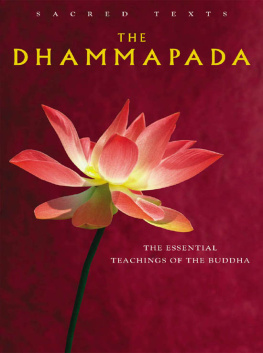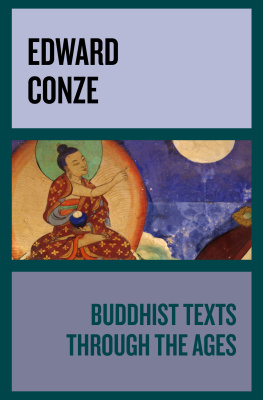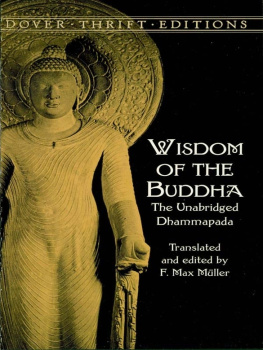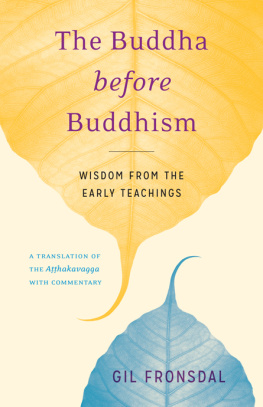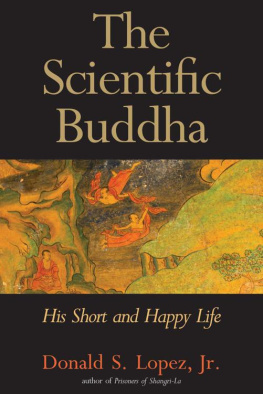Max Muller - The Dhammapada: The Essential Teachings of the Buddha
Here you can read online Max Muller - The Dhammapada: The Essential Teachings of the Buddha full text of the book (entire story) in english for free. Download pdf and epub, get meaning, cover and reviews about this ebook. year: 2012, publisher: Duncan Baird Publishers Limited, genre: Politics. Description of the work, (preface) as well as reviews are available. Best literature library LitArk.com created for fans of good reading and offers a wide selection of genres:
Romance novel
Science fiction
Adventure
Detective
Science
History
Home and family
Prose
Art
Politics
Computer
Non-fiction
Religion
Business
Children
Humor
Choose a favorite category and find really read worthwhile books. Enjoy immersion in the world of imagination, feel the emotions of the characters or learn something new for yourself, make an fascinating discovery.
- Book:The Dhammapada: The Essential Teachings of the Buddha
- Author:
- Publisher:Duncan Baird Publishers Limited
- Genre:
- Year:2012
- Rating:5 / 5
- Favourites:Add to favourites
- Your mark:
- 100
- 1
- 2
- 3
- 4
- 5
The Dhammapada: The Essential Teachings of the Buddha: summary, description and annotation
We offer to read an annotation, description, summary or preface (depends on what the author of the book "The Dhammapada: The Essential Teachings of the Buddha" wrote himself). If you haven't found the necessary information about the book — write in the comments, we will try to find it.
Discover the ancient wisdom that has made Buddhism the most popular non-Biblical religion in Europe and North America
Max Muller: author's other books
Who wrote The Dhammapada: The Essential Teachings of the Buddha? Find out the surname, the name of the author of the book and a list of all author's works by series.
The Dhammapada: The Essential Teachings of the Buddha — read online for free the complete book (whole text) full work
Below is the text of the book, divided by pages. System saving the place of the last page read, allows you to conveniently read the book "The Dhammapada: The Essential Teachings of the Buddha" online for free, without having to search again every time where you left off. Put a bookmark, and you can go to the page where you finished reading at any time.
Font size:
Interval:
Bookmark:

The Essential Teachings of
The Buddha
Translated by
Dr Friedrich Max Mller
Introduction to this edition by
Kevin Trainor PhD

T he Dhammapada, a collection of 423 verses attributed to Gautama Buddha, has a venerable history, both in Asia and in the West. It was the first complete Buddhist canonical text published in Europe in a critical edition with translation (into Latin, in 1855), and it has probably been translated into English and other European languages more frequently than any other Buddhist text.
The Dhammapadas importance for Asian Buddhists over the course of more than two millennia is suggested by its inclusion in the scriptural collections of several Buddhist schools. In addition to the Pali language version upon which this translation is based, similar collections survive in Sanskrit, Prakrit, Tibetan and Chinese. The Pali Dhammapada has long held a special status in the Sri Lankan Theravada Buddhist tradition; monks commonly commit the whole text to memory during their monastic training and frequently base their sermons on its verses.
The texts title, Dhammapada, resists simple translation. Dhamma, the Pali equivalent of the Sanskrit Dharma, is one of the most important terms in Buddhist tradition, and it bears a number of different but related connotations. It can refer to the fundamental truth about reality to which the Buddha awoke under the tree of enlightenment (Buddha is a title meaning one who has awoken), to the words through which he taught that truth to his followers, to the authoritative corpus of those teachings, and finally, to the phenomena or constantly changing interdependent elements that form our experience. All of these related senses of the term appear in the Dhammapadas first chapter: see verse one in which All that we are (dhamma in the plural) is said to follow from our thoughts; verse five where hatreds inability to end hatred is characterized as an old rule (dhamma, singular); and verse twenty where mere recitation of memorized text is distinguished from living fully in accordance with the law (dhamma, singular) to which that text refers. Dhamma in the texts title implies all of these. The term pada at the end of the title likewise evokes multiple meanings: it can be translated path, verses or words. One neednt choose among these, since the Dhammapada is a collection of words set in verse that present the Buddhas middle path to the realization of liberating truth.
The Dhammapada is divided into twenty-six chapters, each loosely organized around a common theme. For example, the opening chapter, The Twin Verses, presents ten sets of paired verses, each pair defining a set of contrasting behaviors or perspectives along with the negative or positive outcome that each brings about. Thus in the first two verses, evil thought leads to pain, while pure thought leads to happiness. In verses thirteen and fourteen, passion penetrates an unreflecting mind, while a well-reflecting mind effectively repels it. These verses, like many others in the collection, give a palpable force to abstract moral and cognitive states through the use of vivid images drawn from daily life. The plodding but inexorable progress of a bullock behind a plow, the inescapability of ones own shadow, and the inevitable leaking of a poorly thatched roof in a sudden rainstorm, bring home the verses message and effectively connect the reader in the present day with the world of ancient India more than two millennia ago.
There is as well much in this text that reminds us of its distance from us. The world of the Dhammapada is inhabited by powerful devas or gods who live in an ascending hierarchy of celestial realms. Unlike the eternal creator God found in the Jewish and Christian Bibles, these gods are ultimately subject to death and rebirth. Prominent among them is Mara, the embodiment of death and the endless round of rebirths, who serves as the Buddhas nemesis.
Yellow-robed mendicants are also frequently at hand: all the verses in the collections penultimate chapter center on the exemplary qualities and accomplishments of bhikshus, ordained members of the Buddhist monastic community. The verses celebrate their self-control and utter detachment from sensual pleasures, along with their independence. At the same time, their beneficent effect on those around them comes through, as in verse 382, where a young monk who applies himself to the Buddhas teaching brightens up this world, like the moon when freed from clouds.
Finally, a brief note about the translator, Friedrich Max Mller, who produced the first complete English translation of the Dhammapada. He was a towering figure in the world of nineteenth-century scholarship on India and the religions of Asia, and is considered one of the founders of the modern discipline of comparative religion. Convinced that a systematic and rigorous comparison of the worlds diverse religious traditions would provide the foundation for a true form of religion, he translated numerous Indian religious texts, and edited the monumental Sacred Books of the East, in which this translation appeared.
Kevin Trainor
The University of Vermont
All that we are is the result of what we have thought: it is founded on our thoughts, it is made up of our thoughts. If a man speaks or acts with an evil thought, pain follows him, as the wheel follows the foot of the ox that draws the carriage.
All that we are is the result of what we have thought: it is founded on our thoughts, it is made up of our thoughts. If a man speaks or acts with a pure thought, happiness follows him, like a shadow that never leaves him.
He abused me, he beat me, he defeated me, he robbed me,in those who harbour such thoughts hatred will never cease.
He abused me, he beat me, he defeated me, he robbed me,in those who do not harbour such thoughts hatred will cease.
For hatred does not cease by hatred at any time: hatred ceases by love, this is an old rule.
The world does not know that we must all come to an end here;but those who know it, their quarrels cease at once.
He who lives looking for pleasures only, his senses uncontrolled, immoderate in his food, idle, and weak, Mra (the tempter) will certainly overthrow him, as the wind throws down a weak tree.
He who lives without looking for pleasures, his senses well controlled, moderate in his food, faithful and strong, him Mra will certainly not overthrow, any more than the wind throws down a rocky mountain.
He who wishes to put on the yellow dress without having cleansed himself from sin, who disregards also temperance and truth, is unworthy of the yellow dress.
But he who has cleansed himself from sin, is well grounded in all virtues, and endowed also with temperance and truth, he is indeed worthy of the yellow dress.
They who imagine truth in untruth, and see untruth in truth, never arrive at truth, but follow vain desires.
They who know truth in truth, and untruth in untruth, arrive at truth, and follow true desires.
As rain breaks through an ill-thatched house, passion will break through an unreflecting mind.
As rain does not break through a well-thatched house, passion will not break through a well-reflecting mind.
Font size:
Interval:
Bookmark:
Similar books «The Dhammapada: The Essential Teachings of the Buddha»
Look at similar books to The Dhammapada: The Essential Teachings of the Buddha. We have selected literature similar in name and meaning in the hope of providing readers with more options to find new, interesting, not yet read works.
Discussion, reviews of the book The Dhammapada: The Essential Teachings of the Buddha and just readers' own opinions. Leave your comments, write what you think about the work, its meaning or the main characters. Specify what exactly you liked and what you didn't like, and why you think so.

